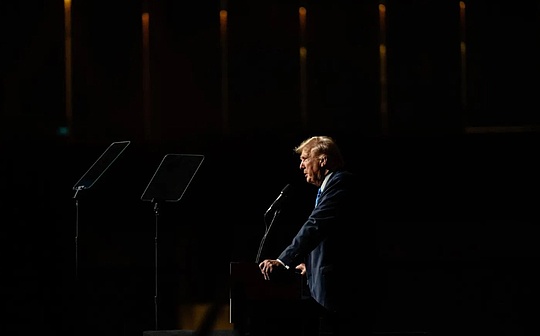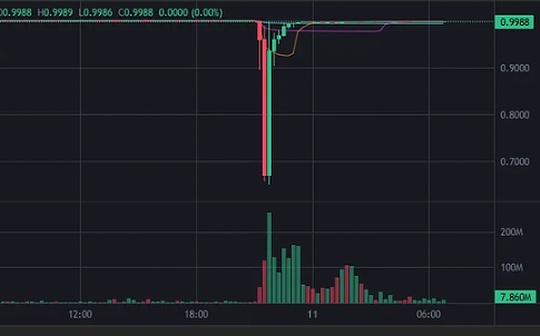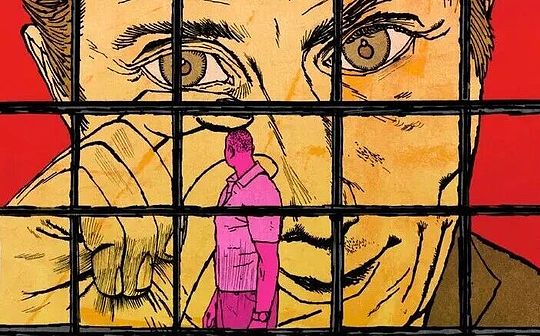
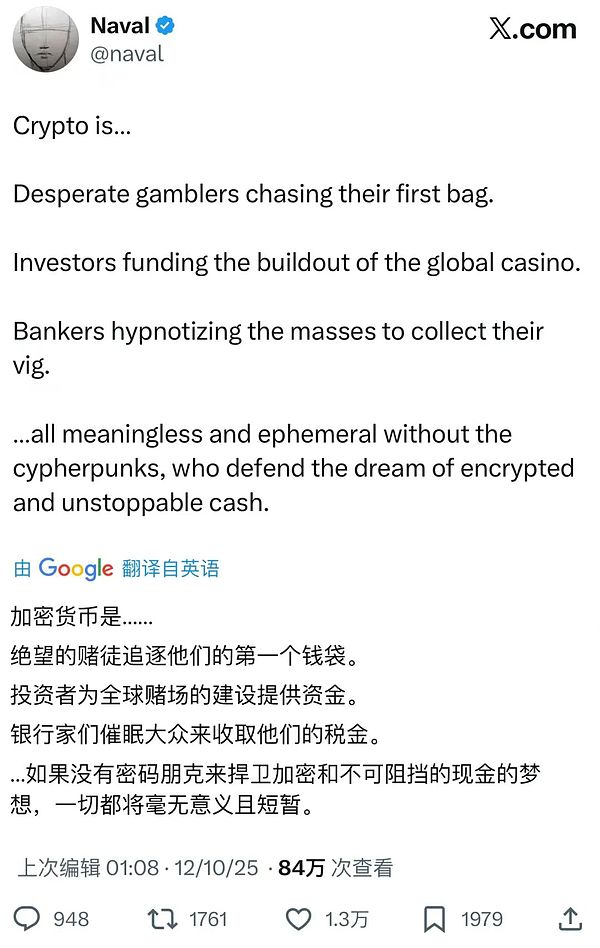
Yesterday, the crypto market collapsed again without warning, and nearly $20 billion in leveraged positions were forced to be liquidated, far exceedingThe US$1.2 billion and US$1.6 billion during the 2020 epidemic and FTX crash becamecryptocurrencyThe largest liquidation incident in history.
At a time when blood is flowing and victims are everywhere, Silicon Valley investor Navarre sent a tweet, which is a bit heartbreaking and a bit cold water, but it expresses the cruel nature of this game:
“Crypto is… meaningless and fleeting as desperate gamblers chase the first bag of money; investors pay for the infrastructure of casinos around the world; bankers hypnotize the masses into pumping money—without the cypherpunks guarding the dream of ‘encrypted, unstoppable cash.’”
If Navarre’s words describe the nihility of the game, an in-depth report from a former senior reporter of the Wall Street Journal reveals another world under the poker table in an almost brutal way – a world when the stakes are worth $1 billion and the “rules” at the table are completely torn up..
There are no financial models in this story, just raw violence.The protagonist is not a trader, but an entrepreneur on the run; the opponent is not the market, but a billionaire and head of state who can use the secret police and private planes to kidnap him directly from Abu Dhabi, bring him back to his country, and put him in jail.
It can be seen from this that when the absolute power of the old world is eyeing the digital wealth of the new world, all “decentralized” ideals appear vulnerable.
This is no longer a “meaningless” digital game in Navarre’s words, but a physical robbery accompanied by a “blood-spattered cell”.When the gambling dog laments, “Please cherish the current price fluctuations,” this story will make you realize with horror that what is more terrifying than the price returning to zero is the power to make you “physically disappear.”
However, it also shows from another aspect that if you are strong enough to withstand the beatings in prison, no one can take away your Bitcoins..
Below is the full text of the former WSJ senior reporter’s article published in Wired magazine.
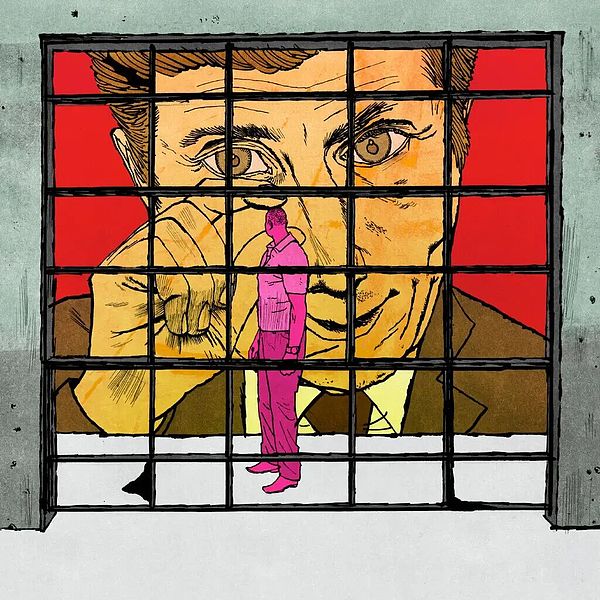
Someone Tipped Me Off About a Crypto Story. What I Found Was Crazy.
Someone broke a cryptocurrency story to me, and what I discovered was jaw-dropping.
Oct. 5, 2025
ByPhilip Shishkin
In late May, a fugitive entrepreneur who controls a huge Bitcoin fortune walked into the lobby of an Abu Dhabi hotel for a routine meeting with a lawyer.Minutes later, he was surrounded by a group of security personnel, whisked away in a two-car convoy, and eventually blindfolded and put on a secret private jet to fly to his native Georgia.
There, he was thrown into jail and asked to transfer his bitcoins to the Caucasus nation’s erratic billionaire master.To reinforce the message, a thug was sent to his cell and beat him until he was unconscious.
At least that’s what the entrepreneur himself says.According to him, it was a dramatic end to his relationship with the Georgian billionaire.More than ten years ago, the two were on the same side.This guy’s name is George·Young man George Bachiashvili,former billionaire bezina· Worked for Bidzina Ivanishvili, helping him manage business and investments.
Over time, Mr Ivanishvili gained almost complete control over Georgia and Mr Bashashvili became increasingly involved in the world of cryptocurrencies, and the relationship eventually fell apart.Now, they are at odds with each other, and one of them seems to be trying to kill the other.
I covered the region as a reporter for many years and have followed it ever since.An acquaintance of mine in Tbilisi mentioned this story to me a few months ago, describing it as a cryptocurrency heist with political overtones.The more I investigate, the more important it becomes.
Over the past few weeks, I have spoken with Mr. Bashashvili’s lawyer, his mother and others who knew him.On the other hand, I corresponded with Mr. Ivanishvili’s lawyer– He denies all accusations,and reviewed accounts of the case published by Georgian media and watchdog agencies.
What I discovered revealed many aspects of today’s world.This story is about one person taking control of an entire country, a process that is happening in Hungary, Türkiye, and— alarmingly — also happens in the United States.
It dramatizes the opportunities and dangers of serving an all-powerful figure,In that environment, absolute loyalty is required and personal initiative is punished.It also highlights how easily individuals can become pawns in geopolitical games.
But the most revealing thing about this story is the technology that underpins its core: cryptocurrency.
Bitcoin is inCreated by Satoshi Nakamoto after the 2009 financial crisis, its true identity remains a mystery.It initially attracted idealists and libertarians and later set the benchmark for cryptocurrency development.While proponents stress the virtues of decentralized finance and blockchain, the space is also rife with malfeasance, speculation and esoteric tokens.
Cryptocurrency tycoons increasingly targeted for robberies and kidnappings, at the same time, potential dictators have also entered the game,Especially US President Trump, who reportedly“$Trump coin” has brought his family $5 billion in profits.
Cryptocurrencies are a wild frontier of wealth and power, and they’re at the heart of this wild cautionary tale.
It is no exaggeration to say that Mr. Ivanishvili rules Georgia.He lives in seclusion and lives in a mansion on the top of a mountain all year round. He is a bit like the supreme leader of Iran, but without the religious overtones and formal title.political party led by himselfSince Georgian Dream came to power in 2012, he has consolidated almost total control by manipulating elections and squeezing out opponents.
In the process, Georgia has transformed from a flawed democracy that yearned toward the West to a bizarre system aligned with Russia that is essentially driven by the whims of a man who holds no public office.
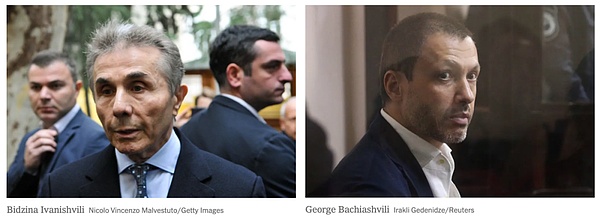
However, inAt the end of the first decade of the 21st century,Ivanishvilithinklooking foris nothing more than a more mundane role: an ophthalmologist.Mr. Ivanishvili’s family wealth is estimated at2.7 billion, he had just returned to Tbilisi from France and was looking for someone to care for his father and children, two of whom needed professional eye care.
He chose a highly respected ophthalmologist, Marina Ramazashvili.She is Mr. Bashashvili’s mother.
During one visit, while waiting for his pupils to dilate, Mr. Ivanishvili chatted with his doctor.She recalled mentioning her son and his work at Booz Allen Hamilton.Booz Allen Hamilton, who was tired of the rigid consulting job.
Mr. Ivanishvili asked her how much her son earned.According to Dr. Ramazashvili, when he heard the figure of $10,000 a month, Mr. Ivanishvili thought he was a “significant man” and asked her to write her son’s phone number on a piece of paper.
Mr. Bashashvili, who holds dual citizenship of Georgia and Russia, soon joined Mr. Ivanishvili’s vast multi-industry business empire.With an MBA from France’s top business school, he rose quickly through the ranks and helped sell his billionaire boss’s Russian assets before he entered Georgian politics.When Mr. IvanishviliWhen he became prime minister in 2012 – he gave up the post just over a year later, preferring to rule from behind the scenes,Mr. Bashashvili joins his team as a financial advisor.
Soon he began helping manage Mr. Ivanishvili’s personal fortune.He has proven to be very good at this, leading a global legal campaign to pursue Credit Suisse (Credit Suisse, where a wealth manager stole hundreds of millions of dollars from Mr. Ivanishvili.
But Mr. Bashashvili also has another important role: running a flagship private equity fund partly funded by Mr. Ivanishvili that aims to invest in the Georgian economy and attract foreign investment.
It was in this position that Bitcoin caught his attention.
Although cryptocurrency was still a new niche industry at the time, Georgia was already one of the largest Bitcoin mining companies in the world.Where BitFury is located.The company takes advantage of the country’s low electricity prices and openness to foreign investment,An innovative data center was chosen to be built in Tbilisi, using computers submerged in coolant to mine Bitcoin.
As for Georgia’s open-door policy,It was Mr. Ivanishvili’s predecessor, MikhailThe political legacy of Mikheil Saakashvili, now in prison on charges widely believed to be fabricated.
Under Mr Bashashvili’s leadership, the private equity fund helped fund BitFury’s expansion.It was an exciting time.BitFury co-founder ValVal Vavilov proposed the idea of putting Georgia’s land registration information on the blockchain to create an immutable and decentralized record of ownership and transactions.
He had planned to add smart contracts,But it failed to come true in the end.Smart contracts areA protocol that is stored on the blockchain and automatically executed when preset conditions are met.The idea is so novel that it even led to a case study being written about it by Harvard Business School.
Mr. Bashashvili has since become a firm believer in the future of Bitcoin, and he wanted to be part of it.
“But if Bitcoin starts to go down, even if they give you Bitcoin, so what?”
that isIn 2015, Mr. Ivanishvili was grilling his young aide.Judging from the transcript of a recorded call I saw, Mr. Ivanishvili was not impressed by a personal deal Mr. Bashashvili was conducting to rent mining power from BitFury.
But his subordinates did seize the opportunity.Mr Bashashvili took out a $5 million loan and added $1.3 million of his own savings to end up with more than 24,000 bitcoins.He sold about half of his bitcoins to repay principal and interest on a loan from a bank then owned by Mr. Ivanishvili.By 2016, his remaining Bitcoins were worth nearly $12 million.
It was a high-risk but brilliant gamble that set the course for the next ten years of Mr. Bashashvili’s life.through his company“Mission Gate” became a global venture capitalist investing in technology start-ups.
He gradually broke away from Mr. Ivanishvili and eventually stopped working for him altogether.He began to have serious misgivings about Georgia’s new direction under its former owner.He spoke out against the government’s pro-Russian leanings in 2022 and condemned Russia’s invasion of Ukraine that same year.
Shortly thereafter, Georgian prosecutors suddenly decided to reinvestigate this nearly ten-year-old Bitcoin transaction.Mr Ivanishvili claimed the young entrepreneur had Bitcoin stolen from him and should return it.
His argument was that the bank loan initially provided to Mr Bashashvili entitles him to a proportionate share of the proceeds.Mr. Ivanishvili actually wanted to be paid twice: once in interest on the loan, and again in the Bitcoin generated using that loan.The controversial Bitcoin is now worth approx.$1 billion.
Mr Ivanishvili may have been wary of Bitcoin a decade ago, but he’s interested now.His lawyer told me that the paragraph suggested Mr. Ivanishvili was skeptical of Bitcoin.The 2015 recording was “not authentic” and contained “marks of editing.”
But he said even this allegedly doctored version could not disprove the fact that Mr Ivanishvili should be considered the real investor in a major part of the deal.His lawyer wrote in a Facebook post that he was simply “demanding the return of cryptocurrencies illegally misappropriated by Mr. Bashashvili.”
Criminal investigations continue to escalate,In 2023, Mr. Bashashvili was formally charged.He was thrown into a state of legal limbo.Meanwhile, Mr. Ivanishvili and his hand-picked political leaders have become increasingly paranoid about so-called enemies at home and abroad.
In the wake of a disputed parliamentary election – in which widespread evidence of electoral fraud and rigging by the Georgian Dream party sparked massive street protests –BashashviliMr Trump has criticized the government’s repression and defended the protesters’ pro-European aspirations, which has undoubtedly made his situation worse.
By March, Mr. Bashashvili’s conviction seemed imminent.He decided it was time to run away.
Early one morning in Tbilisi, Mr. Bashashvili shook off government surveillance agents and squeezed into a tiny hiding place between the trunk and back seat of a dark blue Toyota Camry purchased especially for the operation.(You can watch a video reenactment of his escape produced by Georgian security services.)
According to investigators, a smuggler drove him undetected to a checkpoint on the border with neighboring Armenia, where he entered the country on foot using his Russian passport.From there, Mr Bashashvili flew to the United Arab Emirates, which he considered safe because the country is known for its business environment friendly to cryptocurrency investors.
A week after he fled Georgia, he was convicted in absentia of theft and money laundering and sentenced to11 years in prison.
In the United Arab Emirates, Mr Bashashvili rented a luxury beachfront villa on Saadiyat Island in Abu Dhabi and was joined by his parents.He feeds the community cats and plots his next move.His mother told me that he did not plan to stay in the United Arab Emirates long and wanted to travel to Mexico via France.But his two attempts to fly out of Abu Dhabi and Dubai were thwarted, with Emirates airport officials refusing to let him leave without explanation.
Unknown to Mr Bashashvili at the time, an elaborate operation to abduct him appeared to be under way.Sometime around spring, a man named TamerlaneTimur Kudratov, a Dubai-based entrepreneur, lodged a complaint with UAE authorities alleging that Mr Bashashvili lent him more than $500,000 and never repaid him.Under UAE law, an unpaid debt is enough to put a red flag next to a person’s name and prevent him from leaving the country.
Mr Bashashvili said he had never met Kudratov or borrowed money from him.After he learned of the situation, he immediately wrote to a local lawyer explaining the matter.Emirati authorities quickly dismissed the complaint and Mr Bashashvili was able to regain his freedom to travel internationally, his lawyer said.But he ran out of time.
On May 24, Mr Bashashvili left his beach house and went to a nearby hotel to meet with a lawyer.After the meeting, as he and his bodyguards were preparing to drive back to their villa, six to eight plainclothes officers approached the car and asked Mr. Bashashvili to get out of the car.
They claimed to be members of the Abu Dhabi Criminal Investigation Department.Some were dressed in traditional Emirati attire, others in Western attire and didn’t look or sound like locals.Some of the men looked like Russians or Eastern Europeans, Mr. Bashashvili later recounted to his lawyers.
The men took him to local police headquarters in two unmarked cars.This is a two-day policeAt the beginning of the “hunting trip”, Mr Bashashvili was taken to Dubai and back.Finally, he was shackled and handcuffed and taken to what appeared to be a private airport.He managed to move his blindfold and see the signature red and white colors of the Georgian aircraft.He told his captors that he feared for his safety and life, but they ignored him.
He was escorted onto the plane and his blindfold and restraints were removed.He told lawyers that he saw about five or six people and immediately recognized among them the head of Georgia’s state security service and a former bodyguard of Mr. Ivanishvili.
As the plane took off, they warned him not to talk about his kidnapping, lest he cut off the possibility of future negotiations.He was again blindfolded so that he could not see the pilot when he emerged from the cockpit to use the toilet.He told his lawyers that the rest of the voyage was pure psychological torture.
Part of the puzzle has become clear.According to the Georgian publication Business Media (Business Media recently reported that the plane that brought Mr. Bashashvili back to Tbilisi belonged to the Georgian national airline and had its transponder switched off for much of the flight.
The airline told the publication that it was a private jet that anyone could rent and that the company could not disclose customer information; Mr. Ivanishvili’s lawyers said the Georgian leader never ordered or asked anyone to forcibly return Mr. Bashashvili to Georgia.But it’s not hard to guess who might be behind it.
Why did the UAE allow and even appear to have facilitated this kidnapping?
One theory I heard was that the Gulf state coveted the top job at the United Nations Tourism Organization, a post long held by a veteran Georgian diplomat.Sure enough, ten days before Mr. Bashashvili was kidnapped, Georgia suddenly withdrew its candidate seeking re-election in favor of an Emirati rival, who successfully won the post.
The UAE foreign ministry did not respond to an email requesting comment, and the UAE embassy in Washington acknowledged receiving questions about the case but did not respond.If true, it would be one of the most bizarre reasons for assisting in the surrender of a fugitive.
When the Georgian plane landed in Tbilisi, Mr Bashashvili was taken to prison, where he had a conversation with the prison director.He was told that unless he handed over his crypto wallet and bank account to Mr. Ivanishvili, he would be prepared to meet all kinds of crazy characters in prison..
He refused.
Within days of the warning, a man entered Mr Bashashvili’s cell and beat him severely.that isJuly 11 was just a few days away from Mr. Bashashvili’s 40th birthday.”There was a pool of blood in the cell and the walls were stained with blood,” he wrote in a letter to his attorney.
Mr Ivanishvili’s lawyers said the Georgian leader never ordered or asked anyone to threaten, extort or beat Mr Bashashvili.The Georgian government gave a vague explanation for the kidnapping.
“Even if we theoretically envisioned such an operation, it would be entirely within the law,” said the country’s prime minister, an ally of Mr. Ivanishvili.”When a man sentenced to 11 years in prison is arrested during an operation like this, the law was enforced throughout.”
Georgian security services incredibly claimed that Mr. Bashashvili was arrested on the border between Georgia, Armenia and Azerbaijan.
Meanwhile, BitFury’s data center in Tbilisi,Now abandoned and unused.itIt is both the source of Mr. Bashashvili’s wealth andThatThe source of misfortune.Over the past decade, electricity prices have climbed and Georgia’s overall business environment has deteriorated.
Additionally, the industry itself has become increasingly commoditized, and BitFury has diversified from its mining origins in Georgia into other blockchain software and hardware businesses.The company is also adapting the liquid-cooled data center concept it honed in Georgia to serve the world’s booming artificial intelligence market.
Mr Bashashvili, who has been languishing in prison, has yet to hand over his bitcoins.




